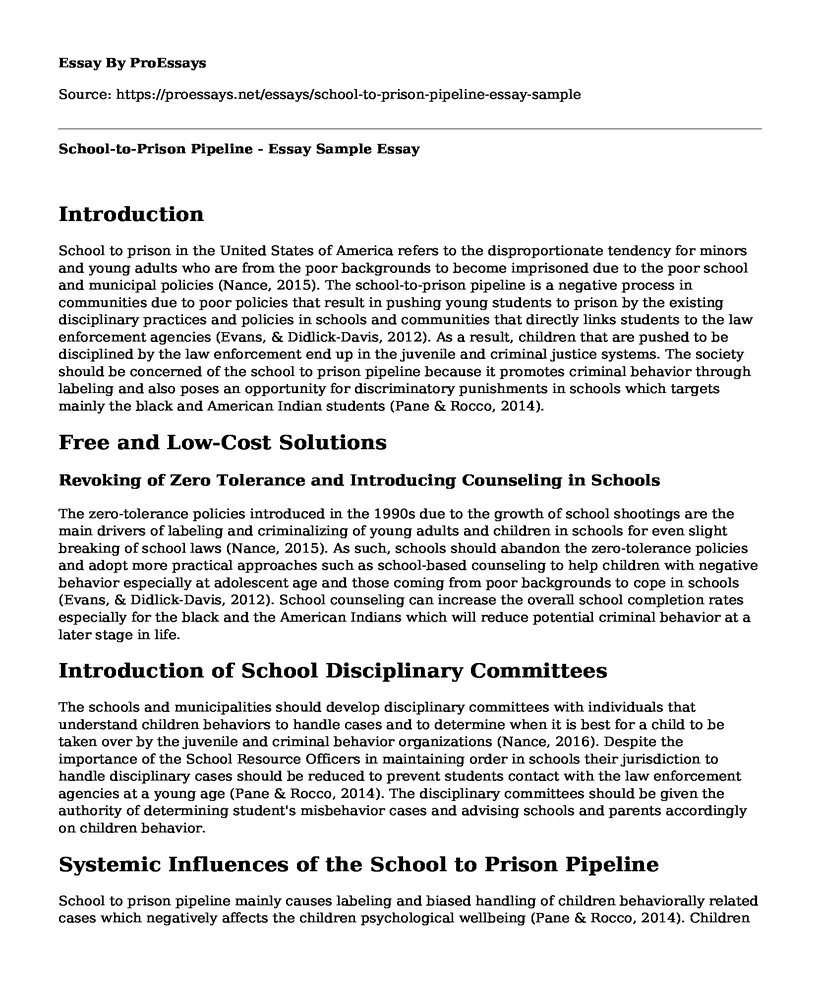Introduction
School to prison in the United States of America refers to the disproportionate tendency for minors and young adults who are from the poor backgrounds to become imprisoned due to the poor school and municipal policies (Nance, 2015). The school-to-prison pipeline is a negative process in communities due to poor policies that result in pushing young students to prison by the existing disciplinary practices and policies in schools and communities that directly links students to the law enforcement agencies (Evans, & Didlick-Davis, 2012). As a result, children that are pushed to be disciplined by the law enforcement end up in the juvenile and criminal justice systems. The society should be concerned of the school to prison pipeline because it promotes criminal behavior through labeling and also poses an opportunity for discriminatory punishments in schools which targets mainly the black and American Indian students (Pane & Rocco, 2014).
Free and Low-Cost Solutions
Revoking of Zero Tolerance and Introducing Counseling in Schools
The zero-tolerance policies introduced in the 1990s due to the growth of school shootings are the main drivers of labeling and criminalizing of young adults and children in schools for even slight breaking of school laws (Nance, 2015). As such, schools should abandon the zero-tolerance policies and adopt more practical approaches such as school-based counseling to help children with negative behavior especially at adolescent age and those coming from poor backgrounds to cope in schools (Evans, & Didlick-Davis, 2012). School counseling can increase the overall school completion rates especially for the black and the American Indians which will reduce potential criminal behavior at a later stage in life.
Introduction of School Disciplinary Committees
The schools and municipalities should develop disciplinary committees with individuals that understand children behaviors to handle cases and to determine when it is best for a child to be taken over by the juvenile and criminal behavior organizations (Nance, 2016). Despite the importance of the School Resource Officers in maintaining order in schools their jurisdiction to handle disciplinary cases should be reduced to prevent students contact with the law enforcement agencies at a young age (Pane & Rocco, 2014). The disciplinary committees should be given the authority of determining student's misbehavior cases and advising schools and parents accordingly on children behavior.
Systemic Influences of the School to Prison Pipeline
School to prison pipeline mainly causes labeling and biased handling of children behaviorally related cases which negatively affects the children psychological wellbeing (Pane & Rocco, 2014). Children exposed to law enforcement agencies grow with animosity towards the community which increases their chances of future incarceration (Nance, 2016). Instead, children misbehavior should be handled as a developmental challenge especially for young people going through adolescence and troubled life at home due to poverty. In this case, school behavioral problems should be handled as a social problem by counselors instead of law enforcement agencies. Besides, it is essential to ensure that children are not intimidated by the presence of the School Resource Officers in the schools.
References
Evans, M. P., & Didlick-Davis, C. R. (2012). Organizing to end the school-to-prison pipeline: An analysis of grassroots organizing campaigns and policy solutions. JEP: EJournal of Education Policy, 1-7. Retrieved from https://in.nau.edu/wp-content/uploads/sites/135/2018/08/Organizing-to-End-the-School-ek.pdf
Nance, J. P. (2015). Students, police, and the school-to-prison pipeline. Wash. UL Rev., 93, 919. Retrieved from https://scholarship.law.ufl.edu/cgi/viewcontent.cgi?article=1782&context=facultypub
Nance, J. P. (2016). Dismantling the school-to-prison pipeline: Tools for change. Ariz. St. LJ, 48, 313. Retrieved from https://scholarship.law.ufl.edu/cgi/viewcontent.cgi?article=1783&context=facultypub
Pane, D. M., & Rocco, T. S. (2014). Transforming the school-to-prison pipeline: Lessons from the classroom (Vol. 60). Springer Science & Business Media. Retrieved from https://www.sensepublishers.com/media/1823-transforming-the-school-to-prison-pipeline.pdf
Cite this page
School-to-Prison Pipeline - Essay Sample. (2022, Dec 04). Retrieved from https://proessays.net/essays/school-to-prison-pipeline-essay-sample
If you are the original author of this essay and no longer wish to have it published on the ProEssays website, please click below to request its removal:
- How Historians Have Interpreted the Speech Essay
- Essay Example on A Seven-Year-Old's Struggles of Adjustment in an Ohio Foster Home
- Joyce Patricia Brown: From Lecturer to Street Living and Struggling With Mental Illness - Essay Sample
- Essay Example on Psychopaths: Impact on Criminal Justice Systems
- Essay Example on Dad Suing School Board After Daughter's Suicide on School Trip
- Friends With Similarities and Differences: Examining Personality Traits - Essay Sample
- Free Report Example on Prisoners as Test Subjects: Pros & Cons of Holmesburg Case







